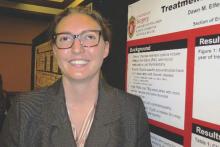CORONADO, CALIF.– Measurement of thyroid antibodies had no impact on the clinical features of Graves’ disease best treated with surgery, results from a single-center retrospective study showed.
The findings are part of a larger study meant to develop ways to help patients decide between surgery and radioactive iodine for their Graves’ disease. “We know that certain clinical features make patients lean toward surgery instead of radioactive iodine, including severe ophthalmopathy and young women who have concerns about family planning,” Dr. Dawn M. Elfenbein said in an interview during the annual meeting of the American Thyroid Association. “In the long-term picture, I think that a lot of provider preferences go into this decision, but we’d like to move this to being more of a patient-centered decision. So we’re trying to see if there are biochemical factors about patients that can help us recommend one treatment versus the other.”
Dr. Elfenbein of the section of endocrine surgery in the department of surgery at the University of Wisconsin, Madison, and her associates reviewed the records of 469 patients treated with radioactive iodine (RAI) or surgery for Graves’ disease at the institution during August 2008-September 2013. They excluded patients with contraindications to RAI or those with other indications for surgery or who previously failed either treatment.
Of the 469 patients, 78% were women, and their mean age was 40 years. Most (71%) underwent RAI while 29% underwent surgery. The percentage of patients who opted for surgery increased each year of the study, from 14% in the first year to 52% in the final year.
More than half of the patients (52%) had thyroid peroxidase (TPO) measured prior to treatment, while 44% had thyroglobulin antibodies (TgAb) and 45% had either thyroid simulating immunoglobulin (TSIg) or thyrotropin receptor antibody (TRAb) measured.
Dr. Elfenbein and her associates found that clinical features such as ophthalmopathy or a compressive goiter appeared to influence a patient’s decision to choose surgery over RAI. On bivariate analysis, patients with a positive TSIg or TRAb were significantly more likely to have ophthalmopathy (41% vs. 25%) while patients with positive TgAb were significantly more likely to have goiter (71% vs. 55%). On multivariate analysis, however, antibody positivity was not predictive of ophthalmopathy or goiter.
“Surgery became the primary definitive treatment of choice over RAI for Graves’ disease at our institution over the study period, particularly for younger women,” the researchers wrote in their abstract. The concluded that measurement of thyroid-specific antibodies “does not independently predict those clinical features best treated with surgery. Clinical features and patient preferences should be considered independently from autoantibody levels.”
Dr. Elfenbein acknowledged certain limitations of the study, including its retrospective design and that fact that autoantibody levels were not measured after treatment. “What would be more helpful is to measure antibodies in everyone before they undergo treatment and measure those same antibodies after treatment to see what happens; to see if there are any differences in recurrence rates with higher antibodies,” she said. “We can be more deliberate moving forward.” She reported having no financial disclosures.
On Twitter @dougbrunk

